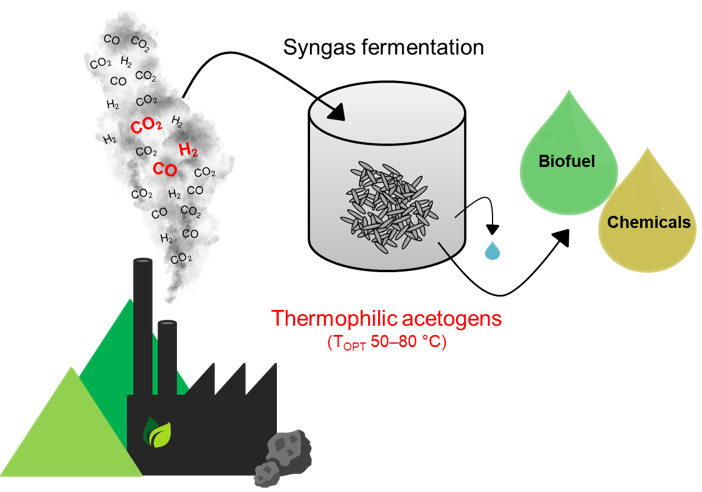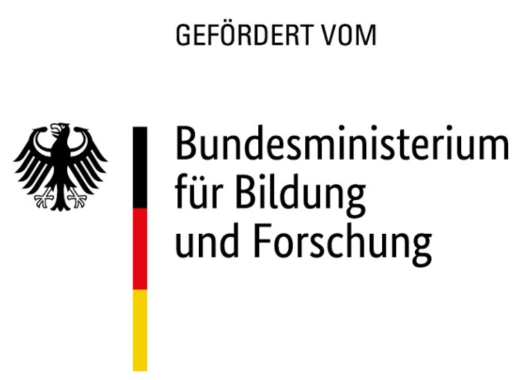ThermoSynCon – “Development of thermophilic microorganisms for syngas conversion to biobased fuels and chemicals”
Synthesis gas (syngas) is a gas mixture mainly consisting of hydrogen (H2), carbon dioxide (CO2) and carbon monoxide (CO). It is produced as industrial waste gas through the incomplete combustion of biomass and municipal waste as well as in iron and steel smelting and coal gasification (Daniell et al., 2012). The bio-based use and conversion of the valuable energy source into biofuels and platform chemicals as well as the resulting reduction in CO2 emissions are of great economic and social interest in terms of an innovative, sustainable bioeconomy. Syngas fermentation using anaerobic acetogenic bacteria (acetogens) enables the natural production of second-generation biofuels (e.g. ethanol or 2-propanol), but also various chemicals (e.g. acetate or acetone) that serve as synthesis modules for numerous other chemicals (Bengelsdorf and Dürre, 2017; Müller, 2019).
Currently, industrial syngas fermentation is carried out by mesophilic acetogens (TOPT 30-40 ° C). In the BMBF-funded project “ThermoSynCon”, we are investigating novel thermophilic acetogens (TOPT 50-80 ° C) for syngas conversion to fuels and chemicals (Basen and Müller, 2017). Fermentation at increased temperatures offers a number of advantages, including a lower risk of contamination, higher conversion rates and lower cooling and distillation costs (Taylor et al., 2009).
Partners
→ Georg-August-Universität Göttingen (Prof. Dr. Rolf Daniel)
→ Johann Wolfgang Goethe-Universität Frankfurt/Main (Prof. Dr. Volker Müller)
→ Eberhard Karls Universität Tübingen (Prof. Dr. LarsAngenent)
→ Universität Rostock (Jun.-Prof. Dr. Mirko Basen)
Team members involved @ University of Rostock:
Jun.-Prof. Dr. Mirko Basen
Dr. Maria Lehmann (2020 bis 2022)
M.Sc. Lisa Engelhardt
Press:
https://www.biospektrum.de/system/files/magazine_article/2020/06/files/79150/79150.pdf
https://www.uni-rostock.de/universitaet/kommunikation-und-aktuelles/medieninformationen/detailansicht/n/hitzeliebende-superhelden-in-derabfallgasverwertung-67187/

Projects
Within the project, we aim to
- isolate and characterize novel thermophilic acetogens for syngas fermentation,
- develop and improve genetic tools for thermophilic acetogens towards their application as industrial platform organisms
- test our developed strains in novel small-scale bioreactors for hot syngas fermentation
References
Basen, M., and Müller, V. (2017) “Hot” acetogenesis. Extremophiles21: 15-26.
Bengelsdorf, F.R., and Dürre, P. (2017) Gas fermentation for commodity chemicals and fuels. Microb Biotechnol10: 1167-1170.
Daniell, J., Köpke, M., and Simpson, S.D. (2012) Commercial biomass syngas fermentation. Energies5: 5372-5417.
Müller, V. (2019) New horizons in acetogenic conversion of one-carbon substrates and biological hydrogen storage. Trends Biotechnol37: 1344-1354.
Taylor, M.P., Eley, K.L., Martin, S., Tuffin, M.I., Burton, S.G., and Cowan, D.A. (2009) Thermophilic ethanologenesis: future prospects for second-generation bioethanol production. Trends Biotechnol27: 398-405.

